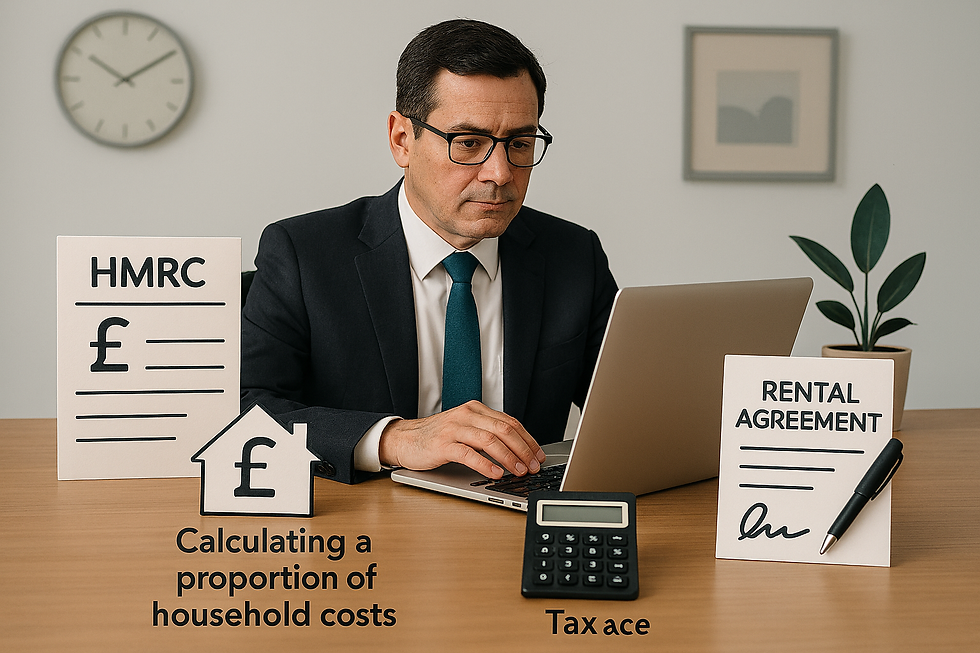Sole Trader vs Limited Company: Which Is Right for Your Business?
- nk2095
- Oct 17, 2024
- 4 min read
When starting a business in the UK, one of the most important decisions you’ll need to make is choosing between operating as a sole trader or forming a limited company. Each structure has its advantages and disadvantages, and the right choice depends on factors like tax efficiency, liability, and long-term business goals. In this guide, we’ll compare the two to help you make an informed decision.

1. What Is a Sole Trader?
A sole trader is a self-employed individual who runs their business as an extension of themselves. This structure is the simplest and quickest to set up, making it popular among freelancers, contractors, and small business owners.
Advantages of Being a Sole Trader:
Easy to Set Up: Becoming a sole trader involves registering with HMRC for self-assessment and paying income tax on profits.
Full Control: You are in complete control of your business and its profits.
Lower Admin Costs: There are fewer regulatory requirements, which means less paperwork and lower accounting costs compared to a limited company.
Disadvantages of Being a Sole Trader:
Unlimited Liability: As a sole trader, you are personally responsible for any debts or liabilities your business incurs. This means your personal assets, such as your home, could be at risk.
Higher Taxes on Higher Earnings: Sole traders pay income tax at the standard rates. If your profits increase significantly, you may end up paying more tax than you would as a limited company.
Perception: Some clients or investors may view sole traders as less established or credible compared to limited companies.
2. What Is a Limited Company?
A limited company is a separate legal entity from its owners (shareholders) and directors. This structure offers more protection for the individual running the business and potential tax benefits.
Advantages of a Limited Company:
Limited Liability: Your personal assets are protected because the company is liable for its debts, not you personally. This offers greater financial security.
Tax Efficiency: Limited companies pay corporation tax (currently 19% in the UK), which may result in lower taxes than paying income tax as a sole trader, especially for higher profits. You can also pay yourself in dividends, which are taxed at a lower rate than income.
Professional Image: Operating as a limited company can give your business a more professional and credible image. Some clients, especially larger companies, may prefer to work with limited companies.
Potential for Growth: It’s easier to attract investment, take on partners, or sell shares in a limited company. This structure is better suited for scaling a business.
Disadvantages of a Limited Company:
More Administration: Running a limited company involves more paperwork and legal obligations, such as filing annual accounts and confirmation statements with Companies House.
Higher Accounting Costs: You will likely need an accountant to help with your company’s finances, as the accounting and tax rules for limited companies are more complex.
Public Financial Information: A limited company’s financial records are available for public viewing, which may not appeal to all business owners.
3. Sole Trader vs Limited Company: Key Comparisons
1. Liability
Sole Trader: Unlimited liability, meaning you’re personally responsible for business debts.
Limited Company: Limited liability, so your personal assets are protected from business risks.
2. Tax
Sole Trader: You pay income tax on your profits, with rates ranging from 20% to 45%, plus National Insurance Contributions (NICs).
Limited Company: The company pays corporation tax (19 to 25%% in 2024/2025), and you can pay yourself a combination of salary and dividends, which may be more tax-efficient, especially for higher profits.
3. Set-Up Costs and Administration
Sole Trader: Quick, easy, and free to set up with HMRC. Minimal paperwork is required, and you only need to file an annual self-assessment tax return.
Limited Company: More complex to set up, with an initial Companies House registration fee. You must also comply with annual filing requirements, which increase administrative costs.
4. Perception and Growth
Sole Trader: Seen as small-scale and individual. Ideal for freelancers, small-scale traders, and consultants.
Limited Company: Often perceived as more professional and established. It offers more growth opportunities, such as bringing on investors, raising capital, or expanding the business.
4. When to Choose a Sole Trader Structure
A sole trader structure may be the best option if:
You’re starting a small business or freelancing, with minimal financial risk.
You want simplicity in running your business and don’t want to deal with significant paperwork or accounting costs.
You’re unsure how quickly your business will grow and want flexibility to transition to a limited company later.
5. When to Choose a Limited Company Structure
A limited company may be better suited if:
You expect your business to grow significantly or take on higher financial risk.
You want to take advantage of tax planning opportunities to reduce your tax burden.
You want limited liability protection to safeguard your personal assets.
You need a professional, credible image to attract bigger clients or investors.
6. Can You Switch from Sole Trader to Limited Company?
Yes, many sole traders eventually choose to incorporate their business into a limited company as they grow. This can provide additional tax benefits and liability protection as profits increase. The process involves registering a company with Companies House, opening a business bank account, and possibly transferring assets or contracts to the new entity.
Read about how we helped our client through this process into a thriving corporate structure here.
If you need help deciding which is better for you, start a conversation today - book a call with our experts.








Comments